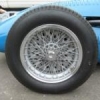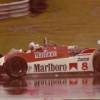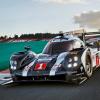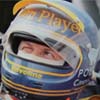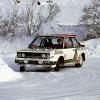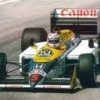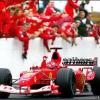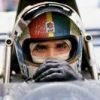The history of Formula 1, and motor racing in general, has always been tinged with tragedy, and many drivers have been killed, preventing them from being world champion. I have made an analysis of how the history of Formula 1 could have looked, hypothetically, if nobody had been killed or injured. I hope this is not considered disrespectful towards the many drivers who have lost their lives racing, I simply find it interesting to think about what they could have achieved if they had lived.
Of course, this is an impossible exercise really. Nobody knows which teams the drivers would have joined if they had survived and how they would have performed there. If teams like Mercedes, Lancia and Vanwall would have stayed longer, and by how much, if it weren’t for the deaths at Le Mans and Ascari at Monza in 1955, and Lewis-Evans in 1958. Also, driving styles might have changed in this scenario; Prost would have been better in the wet, while other drivers would have been less risk averse, while tracks like the Nurburgring and old Spa-Francorchamps would still be being used. And Jochen Rindt accused Lotus of prioritising speed over driver safety so if he was right, perhaps their cars would have been less competitive when no teams had to worry so much about safety, but this has not been factored in. Also, I have often assumed that drivers would stay in the same team for a longer time than is normally the case because it is particularly difficult to guess what team a certain driver would have been at five years after their death. Of course, none of this is fact, and is very open to speculation and arguments about certain years. But it is just supposed to be an interesting discussion point.
1950
Alfa Romeo started Formula 1 with the dominant car, but rather than having the three Fs driving for them, it is Jean-Pierre Wimille leading the team with Achille Varzi and Giuseppe Farina as his teammates, while Fangio races occasionally in a fourth car. I predict that Wimille would have beaten Farina to the first championship, while Varzi would have proved past his best. Meanwhile, Fangio impresses in his sporadic appearances.
1951
Jean-Pierre Wimille continues to lead the Alfa Romeo team, but Juan Manuel Fangio is now the permanent second driver. In the opening races when the team is still dominant, Fangio is instructed to hold station and Wimille beats him in the first few races, but as the Ferrari threat increases from Reims onwards, the drivers are allowed to race each other more often as they try to beat Ferrari and Fangio starts to get the upper hand over Wimille. This title could go any of three ways, but I am going to predict that Wimille and Fangio would have split the points so much that Alberto Ascari and Ferrari sneak through the middle to take the championship.
1952
With the move to Formula 2 regulations and Alfa Romeo’s withdrawal from Formula 1, it is an easy championship for Alberto Ascari and Ferrari, just as it was in real life. Juan Manuel Fangio would not have broken his neck and raced a Maserati, but would not have been able to challenge for the championship. Wimille might have retired, or might have continued, but is unlikely to have been a title contender at this stage. The same could be said of Raymond Sommer, even if he had got a drive in a more competitive car had he survived.
1953-54
I cannot see these seasons going any differently to how they went in real life, realistically, and so Ascari takes the 1953 title with Ferrari ahead of Fangio’s Maserati and Farina’s Ferrari, while he moves to Lancia for a part-season in 1954 and Fangio takes a dominant title after racing for both Maserati and Mercedes-Benz, despite the latter generally not being the best car.
1955
A tragic season in motor racing history, with the deaths of star drivers Bill Vukovich in Indianapolis and Alberto Ascari in Monza, the latter prompting Lancia’s withdrawal from motor racing. The Le Mans disaster, killing Pierre Levegh and 80 spectators, also prompts Mercedes’ withdrawal. I have decided to assume that both teams would have stayed one year longer than they did in the real championship, before eventually leaving anyway. In the 1955 season, it is likely that Juan Manuel Fangio would still have dominated with Stirling Moss playing loyal understudy and learning from the maestro, but Ascari’s Lancia may have been more competitive and allowed him to win a race towards the end of the season.
1956
This could have been a thrilling three-way championship battle between Fangio and Moss in the Mercedes, with Moss no longer willing to be the second driver, as well as Alberto Ascari in the Lancia. The Lancia may have been the fastest car in 1956 but would likely have struggled for reliability, and so I am going to give this championship to Fangio, who was still better than Moss at this time, with Ascari finishing third but leading the most laps. Ferrari would likely have had another awful season like 1955 with a difficult car, but I have decided to assume that Mercedes and Lancia pull out anyway at the end of the year and Ferrari get to use Lancia’s cars for 1957.
1957
The season goes very much like it did in real life, with Fangio winning his fourth title in a Maserati before retiring, ahead of Moss in a Vanwall, but Ascari finishes third in a Lancia-Ferrari.
1958
Ferrari would now have had many options for potential drivers to race with in 1958, including Ascari, Hawthorn, Collins, Musso and Castellotti. But whoever his teammates were, it seems likely that Ascari would have outperformed Hawthorn in 1958 and taken his fourth title, beating the Vanwall of Stirling Moss due to his superior reliability. I have then assumed that Ascari retires at the end of the season. Collins and Musso would still be alive and are potential Ferrari drivers in 1959, but Hawthorn would have retired anyway due to health problems.
1959
Vanwall withdrew at the end of 1958 due to Stuart Lewis-Evans’ death, so like with Mercedes and Lancia, I have decided to assume they would have stayed for one further season before leaving the series. Given they had arguably the fastest car in 1958 and the best driver, I think Vanwall would have sorted out their reliability, and Stirling Moss would have claimed his first championship in 1959, with Tony Brooks possibly finishing second. If Vanwall had withdrawn, then this title could belong to Brooks in a Ferrari because he would not have pitted in the Sebring finale and would have won the race and the title.
1960
With Vanwall now gone, and Ferrari having a poor season, the most significant change for 1960 is that Stirling Moss in a Rob Walker Lotus would not have been injured at Spa and could have raced the full season. He was clearly faster than Brabham, but I think the greater consistency and reliability of the Cooper would have allowed Brabham to take his first world championship.
1961
The year that the shark-nose Ferrari dominated the championship could have gone to any one of many Ferrari drivers in this parallel universe, with Phil Hill perhaps one of the least likely. Had they survived, the car could have been driven by Peter Collins, Luigi Musso or Eugenio Castellotti, while Wolfgang von Trips also might have beaten Hill to the title if it weren’t for his fatal accident. I think Luigi Musso is very likely to have been a Ferrari driver at this time and could have beaten any of the rest in 1961, assuming he had matured more by this point, and so I will choose him as the likely world champion of 1961.
1962
Had he not been seriously injured at Goodwood, Stirling Moss would have raced a privateer Ferrari in 1962, still with the Rob Walker team. With this, I think he would have been far more competitive than the works Ferraris, and would have made it a three-way fight for the championship with Graham Hill’s BRM and Jim Clark’s Lotus, but the car probably wasn’t good enough for him to beat Hill to the championship.
1963
Moss again may have been more competitive than the works Ferraris, and a contender for second overall, but would have no chance of beating Jim Clark in the dominant Lotus.
1964
This season was a three-way battle between Clark of Lotus, Hill of BRM and John Surtees in the Ferrari, ultimately won by Surtees. As I consider Moss to be a stronger driver than Surtees, even accounting for his lack of a works drive I think 1964 would have been his second world championship season.
1965
Like 1963, this title can only go to the Lotus of Jim Clark, who put in arguably the strongest season in Formula 1 history after dominating despite not having a dominant car. I think this would have been a natural point for Moss to retire from Formula 1 as the 1.5 litre era ended.
1966
If it weren’t for his injuries, perhaps John Surtees would have stayed with Ferrari for the full season as he would not have been blocked from competing in sports cars, which caused the dispute. And I think with a full season at Ferrari, Surtees would have beaten Jack Brabham to the championship so would still have been the only champion on two and four wheels.
1967
Just as it went in real life, the reliability of Brabham allows Denny Hulme to take his first championship ahead of the speed of Lotus. Maybe Jack Brabham would have concentrated more on driving than running the team if he hadn’t won the year before, but I still think Hulme was as good as him in 1967 and could have won the title.
1968
After a comfortable victory in the season opener in Kyalami, Jim Clark would surely have won his third championship in 1968 had he not been killed at Hockenheim, with Graham Hill finishing second.
1969
The Lotus may have been unreliable, but I think Jim Clark would have scored a lot more points had he remained with the team in 1969 than Rindt or Hill did and would have taken the title to Jackie Stewart, but while it would have been much closer and a thrilling battle between two of the greats, the overall superiority of the Matra means I think Stewart would still have won his first championship.
1970
With the new Lotus more competitive in 1970, it is likely to have been a battle for the championship between Clark and Rindt, and again I think Clark would still have been the stronger driver and would have won his fourth championship. But I will assume that Clark leaves Lotus and retires at the end of the season as he did seem likely to depart the team at some point and it is difficult to know where he would have gone instead. If he had stayed at Lotus, I think he would have taken two more titles in 1972 and 1973.
1971
Just like the real season, a walkover for Jackie Stewart and Tyrrell.
1972
With the Lotus 72, Emerson Fittipaldi would have a championship battle with Jochen Rindt, still at Lotus, on his hands, and with Rindt more experienced by this point I think he would have beaten Fittipaldi to the championship which he lost in 1970.
1973
With no space at Lotus for Peterson, it is a battle between Fittipaldi and Rindt for Lotus and Stewart and Cevert for Tyrrell. While Rindt at this point would likely have been a stronger driver than either Fittipaldi or Peterson, I am not convinced he could have beaten Stewart, by far the most complete driver of the era, to the championship.
1974
The dangers of motor racing undoubtably contributed to Stewart’s retirement at the end of 1973, and had he stayed with the team he probably would have taken a fourth title in 1974. But it seemed as though Stewart wanted to step aside anyway by this point and so I think Cevert would have led the Tyrrell team, and being a stronger driver at this stage than Jody Scheckter, won his first championship in 1974.
1975
But the Tyrrell team was not competitive enough in 1975 for Cevert to take another title, and Niki Lauda would likely have won this season just like he did in the real championship.
1976
The thrilling battle of Hunt vs Lauda closed up because of Lauda’s accident at the Nurburgring, but without the injuries sustained, he would probably have won this championship fairly comfortably from Hunt and Cevert.
1977
Another championship for Niki Lauda with Ferrari. Perhaps he would have stayed with the team in 1978 had he not been injured on the Nurburgring. James Hunt would have had another strong season with McLaren but fallen short of title honours, perhaps making him the greatest driver never to win a championship.
1978
Even with Lauda driving for Ferrari, they were not competitive enough to deny Mario Andretti his championship for Lotus in 1978 ahead of Ronnie Peterson, who would have completed the season and made his intended switch to McLaren for 1979. Meanwhile Carlos Pace is likely to still be racing for Brabham and could have developed into a very strong driver by this stage.
1979
Ferrari had the strongest car again with Jody Scheckter taking the championship, but if Niki Lauda was still racing for Ferrari, I think he would have won this title instead ahead of Gilles Villeneuve with Scheckter not getting to drive for Ferrari.
1980
A battle between Williams and Brabham, but in this alternate universe it could have been with different drivers. Carlos Pace is likely to have been leading the Brabham team, and been a stronger driver than the inexperienced Nelson Piquet at this time who is still a likely teammate for him. Tony Brise also had outpaced Jones in their early years and so might have been signed for Williams instead. Ultimately, I don’t think peak Brise would have been better than Jones who was the best in the world at this time, but he might have got the opportunity instead due to his stronger performances in the past and so I think Brise would have won the 1980 championship with Williams, while Jones would forever have been a talent wasted in uncompetitive cars.
1981
Once again, it is Williams vs Brabham, but assuming Brise had the same bad luck that befell Jones, I think Carlos Pace could have won this title ahead of Nelson Piquet courtesy of his greater experience meaning he didn’t make so many mistakes.
1982
Tony Brise may not have retired at the end of 1981 as Alan Jones did, leaving Keke Rosberg to wait for Carlos Reutemann to retire two races later before getting his chance at Williams alongside Brise. But neither would have been able to beat the Ferraris to the title if Gilles Villeneuve and Didier Pironi had raced the full season, having the best car in 1982, and I think this title goes the way of Villeneuve.
1983
By now, Piquet would probably be the stronger driver at Brabham than Carlos Pace, but I think the Ferrari was still best car in 1983 and, had Gilles Villeneuve still been driving it, he would have taken his second consecutive championship.
1984
Assuming Niki Lauda still wanted to return to Formula 1 despite having four championships in this alternate universe, he once again edges out Alain Prost for the championship, although Prost was the stronger McLaren driver in 1984. Lauda therefore has five titles and is, at this stage, the most successful driver in Formula 1 history. Villeneuve finishes third overall for Ferrari.
1985
Alain Prost’s season performance to win his first title was one of the strongest in F1 history, and the Ferrari was probably the best car over the course of the season. As a result, I think with Villeneuve as their lead driver, he would have been beaten and Villeneuve would have taken his third title. Gilles Villeneuve may have been erratic in his early years, but he had all the skills required to be one of the greatest of all time and I think he would have realised that potential by 1985.
1986-93
However, despite this, I don’t think there would have been another opportunity for Villeneuve to win a championship, because he wouldn’t have driven a title-winning car again. While he would have become extremely good, I still don’t think he would have been as good as Senna or Prost and so wouldn’t have been signed by McLaren. I think all of these eight titles would have gone exactly how they did in real life, although this version of events where the drivers are safe might have given Prost more of an edge over Senna in their battle for supremacy. Two drivers killed at the start of this period who might have had great success are Stefan Bellof and Elio de Angelis, but in such a competitive era it is unlikely that either would have raced a car good enough to be world champion, unless one of them had signed for Williams instead of Mansell in 1991 and then won in the FW14B the following year.
1994
Ayrton Senna finally got to drive for Williams in 1994 and, although Schumacher was 30 points ahead of him after Imola, I think Senna still would have won the title had he survived because Damon Hill ended up missing out by just one point. Schumacher was given many significant penalties during the season, generally over the top because his Benetton was probably illegal but couldn’t be proven as such, and I think this would be enough to give Senna the edge.
1995
After the bizarre season of 1994, this is the only real opportunity where Schumacher and Senna could have had a proper championship battle in practically equal cars, and would have been a battle for the ages. Although Schumacher won comfortably against Hill and Coulthard who made mistakes, Senna would have been a far more formidable opponent, and given Schumacher’s own tendency to be error prone, I think Senna would have beaten him to the title in 1995, although they surely would have been involved in incidents being arguably the two most aggressive drivers in history.
1996-97
With Ayrton Senna driving for Williams, who had the best car in both seasons, it is hard to argue with him claiming two more championships to bring his total to seven before retiring, assuming he had still won three with McLaren.
1998-present
After this, it is likely that all the rest of the seasons would have gone the same way as they did in reality. Perhaps Robert Kubica or Jules Bianchi could have won races with Ferrari but neither seemed like likely title contenders. Lewis Hamilton still wins seven championships.
Final championship totals:
Ayrton Senna – 7. (1988, 1990, 1991, 1994, 1995, 1996, 1997)
Lewis Hamilton – 7. (2008, 2014, 2015, 2017, 2018, 2019, 2020)
Niki Lauda – 5. (1975, 1976, 1977, 1979, 1984)
Michael Schumacher – 5. (2000, 2001, 2002, 2003, 2004)
Alberto Ascari – 4. (1951, 1952, 1953, 1958)
Juan Manuel Fangio – 4. (1954, 1955, 1956, 1957)
Jim Clark – 4. (1963, 1965, 1968, 1970)
Sebastian Vettel – 4. (2010, 2011, 2012, 2013)
Jackie Stewart – 3. (1969, 1971, 1973)
Gilles Villeneuve – 3. (1982, 1983, 1985)
Alain Prost – 3. (1986, 1989, 1993)
Stirling Moss – 2. (1959, 1964)
Mika Hakkinen – 2. (1998, 1999)
Fernando Alonso – 2. (2005, 2006)
Max Verstappen – 2. (2021, 2022)
Jean-Pierre Wimille – 1. (1950)
Jack Brabham – 1. (1960)
Luigi Musso – 1. (1961)
Graham Hill – 1. (1962)
John Surtees – 1. (1966)
Denny Hulme – 1. (1967)
Jochen Rindt – 1. (1972)
Francois Cevert – 1. (1974)
Mario Andretti – 1. (1978)
Tony Brise – 1. (1980)
Carlos Pace – 1. (1981)
Nelson Piquet – 1. (1987)
Nigel Mansell – 1. (1992)
Kimi Raikkonen – 1. (2007)
Jenson Button – 1. (2009)
Nico Rosberg – 1. (2016)
I'm not sure this list of champions really reflects the ability of the drivers more accurately than the real list. Five championships particularly seems to flatter Lauda, and is perhaps reflective of the comparatively weaker opposition he faced. I would be interested to know what other people think of my scenario. What seasons would have gone differently, in your opinion?










